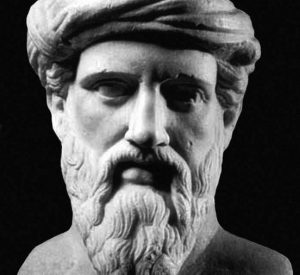Pythagoras 500 BC
Pythagoras was approached by the ruler of Samos one day, or so the story goes, who demanded to know his name and his occupation. “I am Pythagoras,” he answered, “and I am a philosophos” (lover of wisdom). And thus Pythagoras coined the word “philosopher.”
The ancient Greek philosophers were a fascinating and frequently strange lot. Pythagoras was one of the most unusual of them all.
Living on the Greek island of Samos in the 6th century B.C., Pythagoras taught that the entire universe was understandable through an understanding of mathematics. He believed that the heavenly bodies moved according to mathematical formulas and that their movement corresponded to distinct musical notes, essentially creating a universal musical harmony that underlays all of material reality. He taught that living things have immortal souls, he believed in reincarnation, and he practiced vegetarianism, in order to prevent inadvertently destroying a soul in transition.
His teachings attracted a school of followers who revered Pythagoras and regarded him as semi-divine. His followers lived communally, sharing their possessions. Initiates were required to remain silent for the first five years of their admission to the community. In addition to vegetarianism, followers were required to practice chastity (or, if that proved impossible, to be unchaste only in the winter), always put their right sandals on before their left, never use public roads, and, for some unknown reason, never eat fava beans. There were many other such esoteric rules in the community.
Of course what Pythagoras and his followers are most remembered for is their love of mathematics and numbers, which they regarded as divine. But whether Pythagoras discovered the famous theorem we all memorized in high school is subject to some doubt. The first known writing attributing the theorem to Pythagoras is from Cicero, written five centuries after Pythagoras’s death. While it is possible that Pythagoras or his students discovered the formula, it is also possible that it was already known during his time.
Over the centuries following his death, Pythagoras has been called the Father of Mathematics, the Father of Music, and the Father of Geometry. Although his influence has often been exaggerated, Pythagoras has been credited as inspirational by such luminaries as St. Augustine, Copernicus, and Newton. Many have argued that Pythagorean thought influenced Plato in his development of the idea of a dual body and immortal soul. The defense of vegetarianism attributed to Pythagoras in Ovid’s Metamorphoses has had a significant impact on the development of ethics, influencing a number of famous conversions (such as Tolstoy’s) to vegetarianism. (An interesting side note, until the mid-19th century, in Great Britain people who practiced vegetarianism were called “Pythagoreans.”)
Pythagoras left Samos and moved to Croton, in southern Italy, when he was about 40 years old. There he continued teaching, attracting both followers and critics. Sometime around 500 B.C., the community was attacked by local people, enraged over the Pythagoreans’ opposition to Croton’s conversion to democratic government. Although the details are lost to history (or obscured by confusing contradictory accounts) it is likely that Pythagoras, at about age 75, was killed in the attack.
